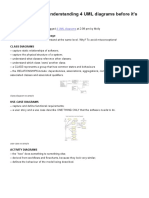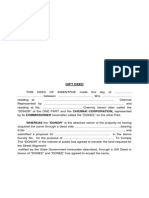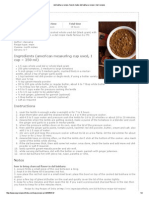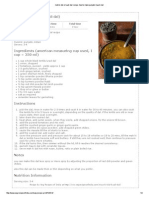0 ratings0% found this document useful (0 votes)
73 viewsManagement Solutions
This summary describes a business parable called "The Shipbuilder" that teaches five principles of leadership. It explains that leadership is the most critical component of any organization. The story is set in ancient Greece and follows a character named Marcus who struggles as a shipbuilder until he learns the five principles of leadership from a man named Barnabas. These principles include getting more done with fewer people, supervising less, building teamwork, decreasing employee turnover, and improving morale.
Uploaded by
junkyardCopyright
© © All Rights Reserved
We take content rights seriously. If you suspect this is your content, claim it here.
Available Formats
Download as DOCX, PDF, TXT or read online on Scribd
0 ratings0% found this document useful (0 votes)
73 viewsManagement Solutions
This summary describes a business parable called "The Shipbuilder" that teaches five principles of leadership. It explains that leadership is the most critical component of any organization. The story is set in ancient Greece and follows a character named Marcus who struggles as a shipbuilder until he learns the five principles of leadership from a man named Barnabas. These principles include getting more done with fewer people, supervising less, building teamwork, decreasing employee turnover, and improving morale.
Uploaded by
junkyardCopyright
© © All Rights Reserved
We take content rights seriously. If you suspect this is your content, claim it here.
Available Formats
Download as DOCX, PDF, TXT or read online on Scribd
You are on page 1/ 3
Everything rises and falls on leadership.
Leadership is the most critical ingredient in any
organization. We all understand the importance of good leadership and know it when we see it,
but describing or teaching leadership is elusive at best. Enter "The Shipbuilder." This delightful
business-management parable set in ancient Greece teaches the Five Principles of Leadership.
Everything rises and falls on leadership. Leadership is the most critical ingredient in any organization. We
all understand the importance of good leadership and know it when we see it, but describing or teaching
leadership is elusive at best.
Enter, The Shipbuilder. This delightful business-management allegory set in ancient Greece teaches the
Five Principles of Leadership; as effective today as they were 2,500 years ago. Learn how to:
get more done with fewer people
supervise less
build teamwork
decrease employee turnover, and
Improve everyones morale including your own!
About the Author
Jack Myrink is president and founder of Management Solutions, a management training company, as
well as head of Myrick Enterprises, a restaurant development group. He lives in Central Oklahoma and is
blessed with a wonderful wife and three incredible daughters. Jack's presentations and workshops are
known for their Southern charm and practicality.
Table of Contents
1. Marcus Fights Exhaustion
2. Arayliss Has A Suggestion
3. Marcus Bumps Into Barnabas
4. Barnabas Offers Marcus A Deal
5. Marcus Shows His Appreciation.
6. Marcus Notices A Change Brewing
7. The Two Rubies
8. The Men Feel The Change Brewing
9. Marcus Learns The Value Of Authority
10. Immediate Respect
1 1. Unearned Love
12. An Environment To Thrive In
13. The Unifying Principle
14. Julius Steps Up
15. Marcus Delivers The Ship To The New Owner,
16. Barnabas Invites Marcus To His Estate
Practice
The Principles
About The Author.
BOOK DETAILS
Publisher Jaico Publishing House
Publication Year 2006
ISBN-13 9788179925805
ISBN-10 8179925803
Language English
Edition 1st Edition
Binding Paperback
Number of Pages 96 Pages
You might also like
- The Leadership Challenge: How to Make Extraordinary Things Happen in OrganizationsFrom EverandThe Leadership Challenge: How to Make Extraordinary Things Happen in Organizations5/5 (1)
- Jesus CEO Using Ancient Wisdom For Visionary Leadership by Beth100% (2)Jesus CEO Using Ancient Wisdom For Visionary Leadership by Beth214 pages
- How's the Culture in Your Kingdom?: Lessons from a Disney Leadership JourneyFrom EverandHow's the Culture in Your Kingdom?: Lessons from a Disney Leadership Journey4.5/5 (3)
- Leadershift: The 11 Essential Changes Every Leader Must EmbraceFrom EverandLeadershift: The 11 Essential Changes Every Leader Must Embrace4.5/5 (19)
- Rare Leadership in the Workplace: Four Habits that Improve Focus, Engagement, and ProductivityFrom EverandRare Leadership in the Workplace: Four Habits that Improve Focus, Engagement, and ProductivityNo ratings yet
- Leadershift Workbook: Making the Essential Changes Every Leader Must EmbraceFrom EverandLeadershift Workbook: Making the Essential Changes Every Leader Must EmbraceNo ratings yet
- Leadership Rites of Passage: The Journey of the Aspiring Leader and the Methods of the MentorFrom EverandLeadership Rites of Passage: The Journey of the Aspiring Leader and the Methods of the MentorNo ratings yet
- Scaling Leadership: Building Organizational Capability and Capacity to Create Outcomes that Matter MostFrom EverandScaling Leadership: Building Organizational Capability and Capacity to Create Outcomes that Matter MostNo ratings yet
- Michael Abrashoff - It's Your Ship - Management Techniques From The Best Damn Ship in The Navy - Business Plus (2002)100% (2)Michael Abrashoff - It's Your Ship - Management Techniques From The Best Damn Ship in The Navy - Business Plus (2002)160 pages
- Put People First: A Story About Powerful Leadership and Professional GrowthFrom EverandPut People First: A Story About Powerful Leadership and Professional GrowthNo ratings yet
- Extraordinary Leadership in Australia and New Zealand: The Five Practices that Create Great WorkplacesFrom EverandExtraordinary Leadership in Australia and New Zealand: The Five Practices that Create Great WorkplacesNo ratings yet
- What Happens Now?: Reinvent Yourself as a Leader Before Your Business Outruns YouFrom EverandWhat Happens Now?: Reinvent Yourself as a Leader Before Your Business Outruns YouNo ratings yet
- The Everyday Leader: 14 Marine Corps Traits to Unlock Your Leadership DNAFrom EverandThe Everyday Leader: 14 Marine Corps Traits to Unlock Your Leadership DNA4.5/5 (2)
- What Do Leaders Really Do?: Getting under the skin of what makes a great leader tickFrom EverandWhat Do Leaders Really Do?: Getting under the skin of what makes a great leader tickNo ratings yet
- The Leader's Greatest Return: Attracting, Developing, and Multiplying LeadersFrom EverandThe Leader's Greatest Return: Attracting, Developing, and Multiplying Leaders4.5/5 (5)
- Power Ambition and Glory by Steve Forbes: LeadershipNo ratings yetPower Ambition and Glory by Steve Forbes: Leadership13 pages
- One Piece of Paper: The Simple Approach to Powerful, Personal LeadershipFrom EverandOne Piece of Paper: The Simple Approach to Powerful, Personal Leadership4/5 (3)
- The Magnetic Leader: 18 Essential Actions of Leaders People Love To FollowFrom EverandThe Magnetic Leader: 18 Essential Actions of Leaders People Love To FollowNo ratings yet
- Cracking the Leadership Code: Three Secrets to Building Strong LeadersFrom EverandCracking the Leadership Code: Three Secrets to Building Strong LeadersNo ratings yet
- The Heart of Leadership: Becoming a Leader People Want to FollowFrom EverandThe Heart of Leadership: Becoming a Leader People Want to FollowNo ratings yet
- The E-Myth Chief Financial Officer: Why Most Small Businesses Run Out of Money and What to Do About ItFrom EverandThe E-Myth Chief Financial Officer: Why Most Small Businesses Run Out of Money and What to Do About ItNo ratings yet
- Mindful Command: The Way of the Evolving Leader - HIGHLY COMMENDED LEADERSHIP BOOK OF 2024From EverandMindful Command: The Way of the Evolving Leader - HIGHLY COMMENDED LEADERSHIP BOOK OF 2024No ratings yet
- The Essential Leader: 10 Skills, Attributes, and Fundamentals That Make Up the Essential LeaderFrom EverandThe Essential Leader: 10 Skills, Attributes, and Fundamentals That Make Up the Essential LeaderNo ratings yet
- Bridge the Gap: How Leaders Can Revitalize Broken OrganizationsFrom EverandBridge the Gap: How Leaders Can Revitalize Broken OrganizationsNo ratings yet
- Successful Self-Leadership: An Inside-Out Approach in Seven StepsFrom EverandSuccessful Self-Leadership: An Inside-Out Approach in Seven StepsNo ratings yet
- Succession Thinking: Build a resilient business and deliver sustained valueFrom EverandSuccession Thinking: Build a resilient business and deliver sustained valueBill WithersNo ratings yet
- Growing Weeders Into Leaders: Leadership Lessons from the Ground LevelFrom EverandGrowing Weeders Into Leaders: Leadership Lessons from the Ground LevelNo ratings yet
- Three Peaks Leadership: How to make it as a CEO (and beyond)From EverandThree Peaks Leadership: How to make it as a CEO (and beyond)No ratings yet
- The Leader's Climb: A Business Tale of Rising to the New Leadership ChallengeFrom EverandThe Leader's Climb: A Business Tale of Rising to the New Leadership ChallengeNo ratings yet
- Elon Musk’s Leadership Lessons : Practical Leadership Skills for the 21st Century: Elon Musk Mental ModelsFrom EverandElon Musk’s Leadership Lessons : Practical Leadership Skills for the 21st Century: Elon Musk Mental ModelsNo ratings yet
- Book Review The Leader Who Had No Title PDFNo ratings yetBook Review The Leader Who Had No Title PDF7 pages
- The MRNA Vaccines Are Looking Better and BetterNo ratings yetThe MRNA Vaccines Are Looking Better and Better4 pages
- Spend 5 Minutes Understanding 4 UML Diagrams Before It's Too Late! - Pineapplie's WeblogNo ratings yetSpend 5 Minutes Understanding 4 UML Diagrams Before It's Too Late! - Pineapplie's Weblog2 pages
- S.O.L.I.D. Software Development, One Step at A TimeNo ratings yetS.O.L.I.D. Software Development, One Step at A Time36 pages
- Css - Divide - Content - Area Into Two Columns - Stack OverflowNo ratings yetCss - Divide - Content - Area Into Two Columns - Stack Overflow5 pages
- Personal Router Configuration Guide - Tikona Digital NetworksNo ratings yetPersonal Router Configuration Guide - Tikona Digital Networks3 pages
- Welcome To The Big Chair. Now Prove You Deserve It: Kate SouthamNo ratings yetWelcome To The Big Chair. Now Prove You Deserve It: Kate Southam3 pages
- Viewsic VXSMH: Viewsonic Vx2270Smh-Led Monitor FeaturesNo ratings yetViewsic VXSMH: Viewsonic Vx2270Smh-Led Monitor Features3 pages
- Chana Dal Recipe: Ingredients (American Measuring Cup Used, 1 Cup 250 ML)No ratings yetChana Dal Recipe: Ingredients (American Measuring Cup Used, 1 Cup 250 ML)2 pages
- Tawa Paneer Masala Recipe: Ingredients (American Measuring Cup Used, 1 Cup 250 ML)No ratings yetTawa Paneer Masala Recipe: Ingredients (American Measuring Cup Used, 1 Cup 250 ML)1 page
- Mango Dal Recipe: Ingredients (American Measuring Cup Used, 1 Cup 250 ML)No ratings yetMango Dal Recipe: Ingredients (American Measuring Cup Used, 1 Cup 250 ML)2 pages
- Mah Ki Dal Recipe (Kaali Dal) : Ingredients (American Measuring Cup Used, 1 Cup 250 ML)No ratings yetMah Ki Dal Recipe (Kaali Dal) : Ingredients (American Measuring Cup Used, 1 Cup 250 ML)2 pages
- Paneer Makhani Recipe: Ingredients (American Measuring Cup Used, 1 Cup 250 ML)No ratings yetPaneer Makhani Recipe: Ingredients (American Measuring Cup Used, 1 Cup 250 ML)1 page


















































































